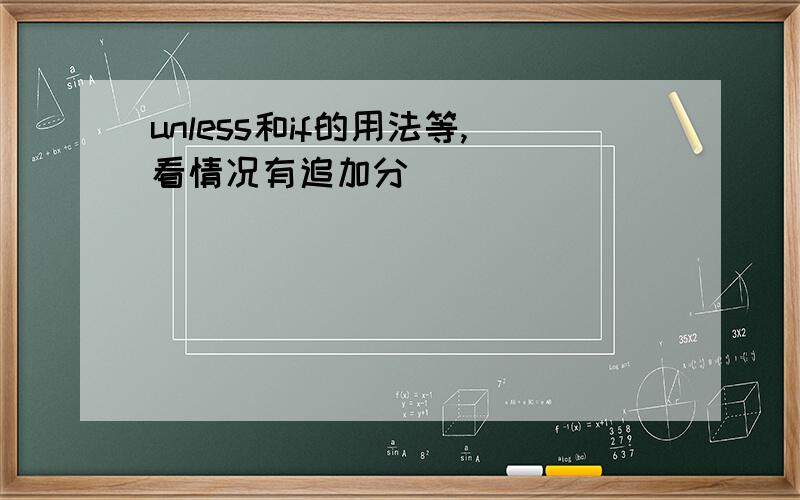unless和if的用法等,看情况有追加分
来源:学生作业帮助网 编辑:作业帮 时间:2024/11/29 02:05:43

unless和if的用法等,看情况有追加分
unless和if的用法等,看情况有追加分
unless和if的用法等,看情况有追加分
Unless: conj. 除非, 如果不
unless是从属连词,引导条件状语从句,含有否定意义,相当于if条件状语从句的否定形式.所以unless = if not.注意:unless引导的条件状语从句和if条件状语从句,与其它时间状语从句一样,用一般现在时代替将来时.
1. Unless you take more care, you’ll have an accident.
(如果不多加小心的话,你会出事故的.)
2. My baby sister never cries unless she is hungry.
(我那刚出生的妹妹除非饿了,否则她是从来不哭的.)
3. Unless bad weather stops me, I jog every day.
(除非坏天气阻拦我,否则每天我都慢跑的.)
if
1. (表示条件)如果 ,主句用将来时,if从句用现在时表示将来
He will come if you invite him.
如果你请他,他会来的.
2. (表示虚拟)假如,要是
1)时态:可以表示过去,现在和将来的情况.它的基本特点是时态退后.
a. 同现在事实相反的假设.
句型 : 条件从句 主句
一般过去时 should( would) +动词原形
If they were here, they would help you.
b. 表示于过去事实相反的假设.
句型: 条件从句 主句
过去完成时 should(would) have+ 过去分词
If she had worked harder, she would have succeeded.
The rice would not have been burnt if you had been more careful.
If my lawyer had been here last Saturday, he would have prevented me from going.
If he had come yesterday, I should / would have told him about it.
含义:He did not come yesterday, so I did not tell him about it.
If he had not been ill and missed many classes, he would have made greater progress.
含义: He was ill and missed many lessons, so he did not make greater progress.
c. 表示对将来的假想
句型: 条件从句 主句
一般过去时 should+ 动词原形
were+ 不定式 would + 动词原形
should+ 动词原形
If you succeeded, everything would be all right.
If you should succeed, everything would be all right.
If you were to succeed, everything would be all right.
3. 是否 = whether 连接宾语从句
I wonder if she is ill.
不知她是否病了.
111